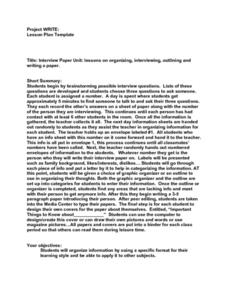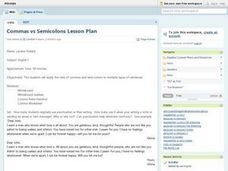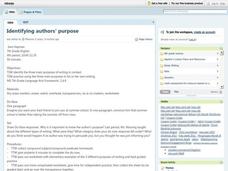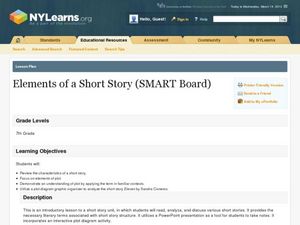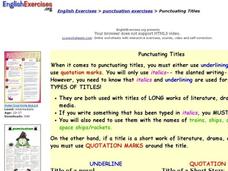Curated OER
Suffixes
Many words have suffixes, and knowing them can help scholars with vocabulary and spelling. They read a brief introduction explaining suffixes and giving two examples: -ly and -ful. Then, learners add these suffix examples to seven base...
Curated OER
Developing Relationships with Older People
Students read books and view movies about older people. They write a questionnaire to interview older people at a retirement center, interview the people, record their information on graphs, and write follow-up letters.
Curated OER
Getting to Know You
Need a first day ice breaker? Try this getting to know you exercise. Pupils stand in a circle and introduce themselves. The trick is they add an adjective that describes them and starts with the same letter as their first name. Add a...
Curated OER
Simple, Compound, Complex, and Compound-Complex Sentences
What kind of sentence is it? This can be a complex subject, so don't compound the difficulty by skipping over the topic! It's simple, just have your class read and go over the information here and then complete the included exercise.
Curated OER
Project WRITE: Class Interview Book
Get your language arts class moving, build community, and strengthen writing skills with this kinesthetic activity. The class brainstorms interview questions from which each chooses three. Individuals then collect information about six...
Curated OER
Commas vs. Semicolons Lesson Plan
Ninth graders use correct punctuation when writing. After defining the use of commas and semicolons, they discuss how punctuation can help eliminate confusion. They listen to a letter, first with correct punctuation, and then without...
Curated OER
Beary O'Mometer Learns About Careers In Meteorology
Students explore the field of meteorology. In this meteorology lesson, students explore weather-related careers as they research the field of study as well as various weather concepts. Students interview meteorologists, write business...
Courseware Solutions
Understanding Algebraic Expressions
Prealgebra apprentices read seven phrases and write an expression for each. The printable version of the worksheet is not very attractive; it has the standards information printed at the top. The problems are arranged in a table and are...
Curated OER
Identifying author's purpose
Why is it important to know an author's purpose? After reviewing the three main purposes of writing, seventh graders write a persuasive letter to convince why summer school is better than taking the summer off. They can then join in a...
Curated OER
Connecting the Dots: Workers and Their Importance
Students explore the role of workers and their jobs in the community. They write a friendly letter to a community worker expressing appreciation for the work they do and their importance to the community.
Curated OER
Elements of a Short Story (SMARTboard)
TV for homework? Your pupils' dreams have come true! After reading Sandra Cisneros's "Eleven," they analyze the elements of the story, particularly the plot and and climax. The instructional activity could work with any short story that...
Curated OER
Poetry Writing Practice
In this poetry writing learning exercise, students identify the topic, similes, metaphors, onomatopoeia, rhyme scheme, and alliteration in a poem. Students fill out this information in a given diagram.
Curated OER
Bulleted Lists: punctuating items in vertical lists
What is easier to read: a bulleted list or a block of text? Look at different examples with your class and then go over the style guidelines for vertical lists.
Curated OER
ESL: Punctuating Titles
When are titles underlined, italicized, or placed in quotation marks? Take your class to the computer lab to give them some independent practice. Here they read through the information, examples, and explanations provided. They then...
Curated OER
Voter Behavior
Transform your government students into informed voters with this straightforward worksheet. Five matching questions and five multiple choice questions test students' knowledge on voter behavior and political parties, and the format...
Curated OER
Standard Punctuation
Clear up the confusion that comes with the question, do I use a comma or a semicolon? This presentation provides examples and reasons for using particular end marks, apostrophes, commas, or semicolons. Information is presented in a well...
Curated OER
Why Thank You!
Fifth graders listen to a read aloud of Patricia Polacco's, Thank You, Mr. Falker! students examine the use of voice in the book, discuss the writing and theme ideas. They write a thank you not to their hero.
Curated OER
Before You Were Mine
Young scholars discuss animal adoption and pet care. In this pet instructional activity, students listen to the story Before You Were Mine by Maribeth Boelts. They discuss animals body language, feelings, and how to best car for them.
Curated OER
Nonfiction Genre Mini-Unit: Persuasive Writing
Should primary graders have their own computers? Should animals be kept in captivity? Young writers learn how to develop and support a claim in this short unit on persuasive writing.
National Park Service
Fire Ecology on the Rim
An engaging unit on wildfires includes three sections, including a background section with eight lessons and five activities, a field experience section with 13 lessons and five activities, and a conclusion section featuring an analysis...
Loudoun County Public Schools
Figurative Language Packet
A definitive resource for your figurative language unit includes several worksheets and activities to reinforce writing skills. It addresses poetic elements such as simile and metaphor, personification, hyperbole, and idioms, and...
Curated OER
Native Americans of the Chesapeake Bay: Using Primary vs. Secondary Sources
Discover the rich Native American culture that existed at the time of early European exploration into the Chesapeake region through analysis of several primary and secondary sources.
Curated OER
Dear Darla
Young scholars write a letter. In this language arts lesson plan, students play the role of an advice column journalist. Young scholars respond to a letter asking for advice.
Curated OER
Good and Bad Emails
For this ESL worksheet, students read good and bad examples of formal and casual emails. Students cut apart emails into strips and assemble them. There are no logical directions for what to do on these five pages.






